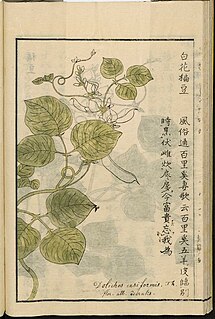Related Research Articles

Lablab purpureus is a species of bean in the family Fabaceae. It is native to Africa and it is cultivated throughout the tropics for food. English language common names include hyacinth bean, lablab-beanbonavist bean/pea, dolichos bean, seim bean, lablab bean, Egyptian kidney bean, Indian bean, bataw and Australian pea. It is the only species in the monotypic genus Lablab.
Bradyrhizobium canariense is a species of legume-root nodulating, endosymbiont nitrogen-fixing bacterium. It is acid-tolerant and nodulates endemic genistoid legumes from the Canary Islands. The type strain is BTA-1T.
Bradyrhizobium betae is a species of legume-root nodulating, microsymbiotic nitrogen-fixing bacterium first isolated from the roots of Beta vulgaris, hence its name. It is slow-growing an endophytic. The type strain is PL7HG1T.
Bradyrhizobium cytisi is a bacterium from the genus of Bradyrhizobium.
Bradyrhizobium daqingense is a bacterium from the genus Bradyrhizobium.
Bradyrhizobium ganzhouense is a bacterium from the genus of Bradyrhizobium which was isolated from Acacia melanoxylon.
Bradyrhizobium huanghuaihaiense is a bacterium from the genus of Bradyrhizobium.
Bradyrhizobium jicamae is a Gram-negative, strictly aerobic bacteria from the genus of Bradyrhizobiaceae.
Bradyrhizobium oligotrophicum is a nitrogen-fixing bacteria from the genus of Bradyrhizobium which was isolated from rice paddy soil in Miyagi Prefecture in Japan.
Bradyrhizobium pachyrhizi is a bacterium from the genus of Bradyrhizobium which was isolated from nodules of Pachyrhizus erosus in Guanacaste in Costa Rica.
Bradyrhizobium paxllaeri is a bacterium from the genus of Bradyrhizobium.
Bradyrhizobium erythrophlei is a bacterium from the genus of Bradyrhizobium which has been isolated from the nodules of the tree Erythrophleum fordii.
Bradyrhizobium ferriligni is a bacterium from the genus of Bradyrhizobium which has been isolated from the nodules of the tree Erythrophleum fordii.
Bradyrhizobium ingae is a bacterium from the genus of Bradyrhizobium which has been isolated from the nodules of the tree Inga laurina in Cerrado in Brazil.
Bradyrhizobium manausense is a bacterium from the genus of Bradyrhizobium which has been isolated from the nodules from the plant Vigna unguiculata from the Amazon rainforest.
Bradyrhizobium neotropicale is a bacterium from the genus of Bradyrhizobium which has been isolated from the nodules of the tree Centrolobium paraense from the Amazon rainforest in Brazil.
Bradyrhizobium ottawaense is a nitrogen fixing bacterium from the genus of Bradyrhizobium which has been isolated from the nodules of soybeans in Ottawa in Canada.
Bradyrhizobium guangdongense is a bacterium from the genus of Bradyrhizobium which has been isolated from the effective nodules of a peanut plant.
Bradyrhizobium kavangense is a nitrogen-fixing bacterium from the genus Bradyrhizobium which has been isolated from the nodules of the cowpea Vigna unguiculata in the Kavango region in Namibia.
Bradyrhizobium subterraneum is a nitrogen-fixing bacterium from the genus of Bradyrhizobium which has been isolated from the effective nodules of the peanut Arachis hypogaea.
References
- ↑ LPSN lpsn.dsmz.de
- ↑ "Straininfo of Bradyrhizobium lablabi". Archived from the original on 2015-06-30. Retrieved 2014-07-28.
- ↑ UniProt
- ↑ Chang, Y. L. (2010). "Bradyrhizobium lablabi sp. nov., isolated from effective nodules of Lablab purpureus and Arachis hypogaea". International Journal of Systematic and Evolutionary Microbiology. 61 (10): 2496–2502. doi: 10.1099/ijs.0.027110-0 . PMID 21112989.